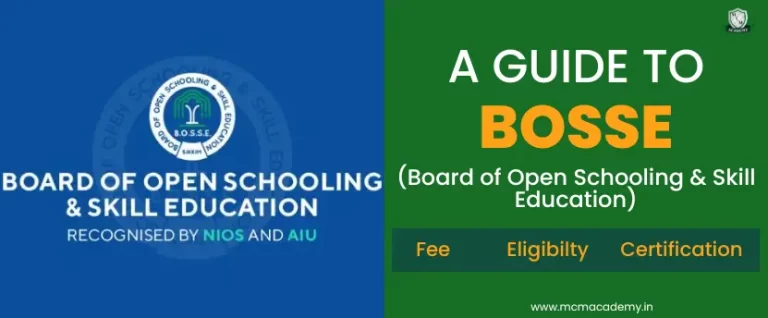Many students in India have found online/distance education to be a great asset because of the flexibility and affordability it provides. However, many students wonder if an online/distance degree is as good as a regular one.
An online degree is equal to a regular degree — if you’re asking this question, you probably have a lot of questions about online degrees and how they compare with traditional degrees from a brick-and-mortar school.
While there are many differences, there are some similarities between the two as well. First, an online degree is a degree from a university (whether it’s an accredited university or not). Second, just like any other type of student at an institution, you’ll likely have access to resources like libraries and tutoring centers that can help prepare you for classwork.
Is Online Degree Equal to Offline Degree?
It is true that an online/distance education degree is the same as a regular education degree. The validity of an online or distance degree is unaffected by these variances, of course. There is no difference between online and regular degrees when it comes to employment or further education opportunities in the public and commercial sectors.
However, the only requirement is that the college you pursue your online/distance degree must be recognized by the University Grants Commission (UGC) which is a statutory body that has been set up by the Ministry of Education (MoE) of India. The Distant Education Bureau (DEB), a unit of the University Grants Commission (UGC) is responsible for overseeing distance and online education in India, and must also provide recognition to the school.
There are, of course, many variations between the two delivery methods of education, such as the fact that in the online and distant mode, you do not receive any hands-on practical training because everything takes place digitally. All of these distinctions, however, are unimportant because the degree’s legitimacy remains unaffected.
The possibility is that if you have an online or remote degree, there will be times when a candidate with an offline degree will be given preference. This is due to the fact that conventional and offline degrees are seen as being superior, but at the same time, recruiters are not permitted to exclude you based only on your online or distant education. All online and distant degrees offered by colleges recognized by DEB and UGC would be treated equally to normal and offline degrees, according to UGC’s notice.
You may be thinking right now that remote learning or online degrees are not advantageous since people still favour traditional degrees. That’s not the case, though. Online/distance aren’t all that horrible; in fact, they are better than the regular ones.
Recruiters don’t care about a candidate’s degree when it comes to the domain- or skill-specific courses like blockchain, AI & ML, cyber security, etc. Instead, they focus on the applicant’s knowledge and skills in these specialized areas. However, there aren’t many offline courses that focus on teaching one particular specialization. Courses on topics like data science, cyber security, AI & ML, blockchain, etc. are not even offered at the IITs. Online courses can prove very handy here. Many huge companies, like Apple, EY, Google, and others, have made graduation optional for applicants since they only evaluate individuals based on their abilities and expertise.
Just to clarify that online/distance degrees are equivalent to offline ones, this minor distinction between the two learning styles was made. Other significant variations exist as well. Let’s go through each one in more depth one by one.
Learning Mode
Learning mode is of course the biggest difference between the two modes of education. For offline regular courses, you must routinely visit a college, attend in-person classes, and keep up your attendance. Both the teachers and your classmates will be accessible to you in person.
You don’t have to go to college in the case of online education. The Learning Management System (LMS) provided by the institution is where all of your lessons, conversations, and access to course materials take place.
There are many different types of learning modes that an online degree can participate in. The most common ones include self-paced, synchronous, and asynchronous.
- Self-paced: This is a traditional way of taking a class that involves following the teacher’s instructions on how to complete assignments by yourself at your own speed. It requires you to be disciplined enough to not procrastinate or take breaks between assignments for too long. You should also stick with what you start working on until it’s done, so as not to confuse yourself later when trying to continue with the next task at hand.
- Synchronous: Synchronous means “to occur or happen at the same time” and refers here to live synchronous lectures where everyone participates in real time via chat rooms or webinars (web-based conferences). While this may seem like an interesting idea for those who prefer face-to-face interactions instead of communicating only through screens (when using other forms), keep in mind that these types of classes tend not only to be expensive but also hard because they require more discipline than regular classes do from students who often get distracted easily.
Fee Structure
- Online Degree – The fee structure of an online degree is very attractive as compared to a regular degree because there are no hidden costs in the fee. There are many schools that offer free admission and free facility for admissions and finishing coursework, but these schools charge a nominal amount for certificates and other services related to completing your course.
- Regular Degree – The fee structure of regular degrees varies with each university because they have their own policies regarding fees charged by them, so you need to find out about it from the concerned university before applying for any course offered by that particular university
Pedagogy & Curriculum
There are many similarities between the pedagogy and curriculum of an online degree and an offline degree. The two types of degrees have different ways to learn, but they have the same standards for teaching and learning, such as critical thinking, problem-solving, and communication skills.
There are also some differences between online degrees and offline degrees when it comes to their curriculum. The most obvious difference is that an online degree does not include physical classrooms or face-to-face interaction with teachers or classmates. Instead, you will be taught through a variety of different methods including videos, slideshows, or other multimedia presentations from your instructor or peers who are taking part in the same coursework with you. This allows students who take courses online to access them anywhere they go since they don’t need physical access like they would if they were attending college classes on campus every day at 8 am sharp every morning.
Examination
- As you may be aware, the conventional regular degree requires students to sit for exams in person at the college where they want to attend.
- Students in online courses, on the other hand, typically have a choice between two alternatives. Exams can be taken online, and students have the option of doing so. Remote proctoring is used for online tests. Exams can be taken from the comfort of your own home, and the invigilation process will be handled by appropriate software. Students can also take their exams in person at a select specified location specified by the college. There is no separate invigilation at such locations. For students who live outside of a city’s metropolitan area, exam centers are frequently available.
Placement
One of the most important factors that you need to consider before taking an online degree course is its placement potential. If you are looking for a job after completing your course, it is important that your degree can help you get a good job and earn a decent salary.
- In the case of offline courses, recruiting companies come to the campus to conduct interviews during placement drives for offline courses. The college campus is where it all happens.
- There are no college-sponsored job fairs for online degree courses. Good institutions, on the other hand, assist their students in securing employment after graduation. They aid in the creation of stronger online personas and curriculum vitae, as well as the preparation of job interviews and the introduction of students to potential employers and internship opportunities.
Faculty
When it comes to online degrees, the faculty is the most important aspect of any online degree course. The faculty should be qualified and experienced. They should also be accessible if you want to ask questions or share your thoughts on the subject.
Most of the time, the faculty for online courses is the same as the faculty for traditional offline courses. It varies from college to college, therefore it’s impossible to say for sure. As a result, when applying for a position at a school, make sure to check the website to see who the faculty members are. The faculty should be the same for both online and offline courses. There are significant differences between teaching in an offline classroom vs an online classroom, so be sure to double- and even triple-check all the small print.
Pros & Cons of Online Degree Courses
There is nothing ideal in its entirety. Everything has its benefits and drawbacks, and online courses are no different. When compared to offline courses, they have some advantages, but they also have some drawbacks.
Advantages of Online Degree Courses
Online degree courses have many advantages over regular degree courses.
- Flexibility: You have the flexibility of studying at any time of day or night that suits you. This is great if you work full time and can’t commute to college during normal working hours.
- Saving money: Online degrees are generally much cheaper than conventional on-campus programs because there’s no need for expensive equipment or facilities such as labs and libraries. Instead, all students need is internet access!
- Convenience: Not having to worry about commuting means that you save time every day in your commute and do not need to plan your schedule around classes (and vice versa). You can choose your own working hours according to your needs and preferences without worrying about how busy it will be at certain times of day–or even what the weather will be like outside! This convenience allows you more freedom when planning out how much time you want/need each week for yourself versus work-related activities (such as studying).
- Discipline-specific courses: An additional benefit of online degree programmes is the availability of specialty courses in a variety of subjects. In offline mode, there are no courses specialized in certain domains. For example, a professional degree in data science or AI & ML is not available in the offline form. Many courses like BCA in AI & ML or BCA in Data Science are available online, though. Those seeking work in highly specialized industries might take advantage of this.
- Career advancement: Another advantage of online degree programmes is that they allow working professionals to upgrade their careers. Online degree courses allow working professionals to gain new skills without having to leave their current positions, which can lead to promotion once the course is over.
Disadvantages of Online Degree Courses
- Risk of validation: One of the major drawbacks of an online degree is the widespread belief that online and distance degrees are of questionable quality. This is due to the fact that there are a number of fake degree-granting universities online. You can avoid this bias by enrolling in an online degree programme from a college that has been accredited by the UGC-DEB. With a single click, you can find out if your college is legitimate. In order to avoid bogus degrees, you must verify the legitimacy of your college.
- No campus life: One of the biggest drawbacks of online learning is that students miss out on campus life. There is no face-to-face interaction between you and your classmates and lecturers.
- Lack of communication: Because of the lack of engagement and communication, many students feel that online degree are less beneficial than a regular degree. Good colleges, despite the fact that there is no face-to-face engagement, have excellent facilities for peer interactions and doubt-resolving sessions. Students can communicate with each other at any hour of the day or night in discussion forums that are always open. Students need to make the most of the discussion platforms given by the college because communication is limited in the online format.
- Procrastination: Because there are no strict deadlines and no strict schedules in online courses, students may acquire a procrastination habit. Because of this, students must be exceptionally focused and disciplined when taking an online course.
FAQs
Q. Are online courses treated equally to regular courses?
Ans. The University Grants Commission (UGC) made it clear in 2018 that degrees earned through open and online programmes at a UGC-recognized university are treated on an equal basis with degrees earned through traditional, on-campus institutions. A new study shows that one out of every four students takes online courses or programmes in order to improve their skills or degrees in order to develop a successful professional career.
Q. What are the advantages of an online degree?
Ans. Studying for an online degree has many advantages compared to a regular one. You have more flexibility with your time and you can study from home, which makes it easier for you to spend more time with family and friends.
Q. Is an online/distance degree considered equivalent to regular degrees by private companies?
Ans. If you have an online/distance degree, it’s important to know that your degree might not be considered equivalent to those earned in a traditional classroom setting. In some cases, employers may even consider your online/distance program as “non-certified” or “self-taught,” which could be detrimental to your overall employment prospects.
Q. What is the difference between an online degree and an offline degree?
Ans. An online degree is a degree where you study entirely online. Online degrees are usually offered by universities, colleges, and other higher education institutes. An offline degree, on the other hand, is a degree that can be earned by attending courses on campus or at regional centers.
Q. Can I get a government job after pursuing an online/distance degree?
Ans. You can get a government job after pursuing an online/distance degree. You just need to make sure you have the right qualifications. If you’re looking for a position as a civil servant, then your best bet is to pursue a Ph.D. in public policy or political science, as these fields require advanced degrees and extensive field experience. If you don’t have either one of those things, then you’ll likely be better off trying something else entirely—like getting into law enforcement or becoming a teacher.























